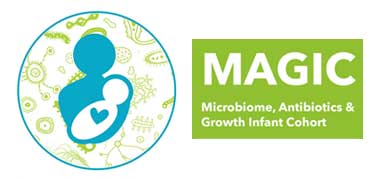HOW CAN WE HELP YOU? Call 1-800-TRY-CHOP
Microbiome, Antibiotics and Growth Infant Cohort (MAGIC) Study
The Microbiome, Antibiotics, and Growth Infant Cohort (MAGIC) Study is a longitudinal cohort study funded by the National Institute of Health that comprises infants ranging from newborn to 2-years-old. Researchers are studying the microbiome in the gut during these first two years of life, when the microbiome develops and changes the most and quickly. The MAGIC study’s purpose is to look at how various factors affect this development. We are particularly interested in understanding the relationship between antibiotics, the microbiome, and growth.
“Microbiome” is a term used to describe all of the microbes, such as bacteria and fungi, that live inside the intestinal tract of all humans. The microbes that live in our intestines perform important functions, such as digesting our food, helping us develop an immune system, and protecting us from infection. Before we are born, we have virtually no immune system, and after birth we quickly begin to take in microbes from all around us. Our mothers are usually the first source of microbes, but environmental factors, such as siblings or pets, and where we live all affect our microbiome.
A vital part of the MAGIC Study is to see how medications, such as antibiotics, may change the microbiome. MAGIC also tracks the child’s growth, such as height and weight, to see if this is related to the types of bacteria in the gut.

- MAGIC completed enrollment of its final and 500th participant in October 2019, after almost three years of recruitment at Pennsylvania Hospital.
- MAGIC has collected more than 6,000 stool samples.
- MAGIC expects to start data analysis toward the end of 2021, after all participants have completed the study.
Leaders
Jeffrey S. Gerber, MD, PhD, MSCE
Associate Chief Clinical Research Officer
Dan Knights, PhD
Associate Professor Biotechnology Institute and Department of Computer Science and Engineering, University of Minnesota